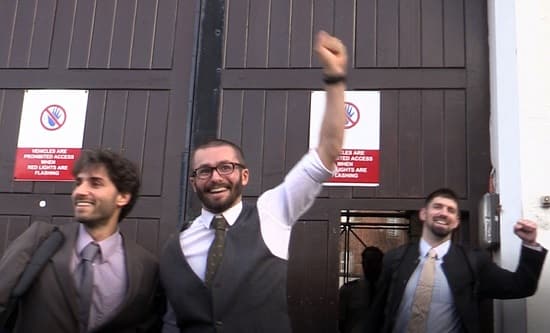
On 17 October three environmental activists, Simon Blevins, Richard Roberts and Rich Loizou, had their prison sentences quashed and were released from prison after spending three weeks of their 15 and 16 month sentences in HMP Preston. They had been convicted on 26 September 2018 of ‘causing a public nuisance’, following protests staged in July 2017, in which they sat on top of lorries for up to 84 hours in order to draw attention to the health and safety hazards posed by fracking (hydraulic fracturation). The protests were supported by Lancashire against Fracking and many local people, as part of ongoing opposition to energy company Cuadrilla’s plans to extract shale gas from the Preston Road area in West Lancashire.
This is not a complete victory, as the protesters were not acquitted; the Chief Justice Sir John Burnett, and two other judges decided the custodial sentences had been too severe and instead gave them community service orders and suspended sentences. More importantly, the government had given the go-ahead for fracking at Preston Road to start on 24 July 2018, and it began on 15 October, shortly before the release of the three.
The original sentence raised embarrassing questions about the trial judge Robert Altham’s vested interests, through his sister who is connected to Cuadrilla and the shale gas lobby. Altham had refused to consider the political aspects of the trial and the fact that the three protestors were motivated by their consciences on fossil fuels, as understood by Article 9 of the European Convention on Human Rights.
The protests against fracking and the imprisoned activists have had widespread support, including from Friends of the Earth, Liberty, Greenpeace, the Green Party and Labour leader Jeremy Corbyn. However many Labour MPs don’t agree with Corbyn’s proposal to end fracking and many Labour councils have collaborated with it, partly by sending in a heavy and often brutal police presence as at Barton Moss in Salford a few years ago, which gave rise to the chant labelling Greater Manchester Police ‘G-G-GMP, I-Gas Private Army’.
But the most important support for the three prisoners, and for the fourth convicted activist, Julian Brock, who was given a suspended sentence after pleading guilty, came from the local community in Lancashire, many of them working class residents worried about the dangers cause by fracking. These dangers include water pollution and birth defects in humans and animals; as well as the emission of methane, a greenhouse gas which over an initial 15 years has a global climate impact 86 times greater than CO2.
There have been regular rallies at Cuadrilla’s proposed drilling sites, and on 6 October a solidarity demonstration of over 500 people marched through Preston to demand the release of the prisoners. In addition 28,500 people signed a petition to protect their right to protest, and many others wrote letters of support. At the Court of Appeal supporters cheered and sang when their release was announced.
In opposition to this, Cuadrilla and the right-wing ‘Lancashire for Shale’ group are continuing to complain about the protests, on grounds of ‘criminality’ and ‘disruption’, and to push for more police intervention. Further protesters were arrested his week on ‘public nuisance’ charges, although these were subsequently dropped. Kevin Blowe, of the police monitoring group Netpol, commented: ‘We have been highlighting for some time now the “chilling effect” attempts to frighten people away from taking part in protests are having on the right to freedom of assembly’.
Cuadrilla is a British-based corporation set up by Lord Browne in 2007 and now chaired by Roy Franklin OBE. It was responsible for two small earthquakes at Weeton, Lancashire in April 2011, and successfully appealed to the Tory government in 2016 against a decision by Lancashire County Council to refuse planning permission to drill at Little Plumpton. Its dirty record is typical of what Theresa May has called ‘the best companies in the world’, which she has pledged to support after Brexit. A statement by the three men, read outside the court, referred to the perils climate change threatens and concluded: ‘Fracking is beginning right now. So there has never been a more critical moment to take action. Your planet needs you.’ We must support them.
Martin Harrison




